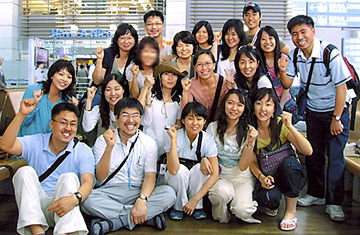
A group of South Korean evangelical Christians pose for a memorial photo before leaving for Afghanistan at Incheon International Airport in Seoul.
With the fate of 22 South Korean hostages in Afghanistan still uncertain, the hostage crisis is finally forcing South Korea's Christians, the world's second-largest group of proselytizers after Americans, to rethink their evangelical ambitions.
Since the start of the hostage crisis last week, when 23 Korean Christian volunteers were captured by Taliban insurgents on a road south of Kabul, the Seoul government has had to ask Korean bloggers to back off from online attacks on the hostages. Critics were particularly incensed by photos posted of some of the young women missionaries posing in front of an Afghanistan travel advisory sign at Seoul's Incheon International Airport. Family members of the missionaries — as well as members of the Sammeul Community Church south of Seoul, which sent the mission — also issued public apologies for causing the country so much grief.
The execution earlier this week of one hostage, pastor Bae Hyung Kyu, 42, brought the expected outpouring of grief and condolences. But non-evangelical Koreans are still scratching their heads over why the Saemmul church group trotted off to such a volatile region, thumbing its nose at government warnings not to enter Afghanistan.
Devout Christians here readily admit the mission was poorly organized, but they insist that it had an admirable purpose. They argue that the group was only doing what it is supposed to do: help others, as Jesus directed them to do. The missionaries wanted to deliver aid and simply didn't care if they were in harm's way.
This is not the first time Korea's Christians have found themselves in strife. In 2004, a Korean interpreter and aspiring Christian missionary was taken hostage and beheaded by militants in Iraq. Seven other missionaries have been kidnapped but later released in that country. Afghanistan also deported more than 1,000 Korean Christians, including children, for gathering at a peace festival there last summer.
Many of Korea's Christians are passionate evangelists, exhibiting the zeal of the newly converted. Evangelical Protestantism is a relatively recent arrival on the peninsula, having taken hold only after the Korean War. Now, fully one-third of the 45 million people in this traditionally Confucian society follow the practices of Jesus (about 10% are Roman Catholic). An estimated 16,000 Korean Christians were working around the world as missionaries in more than 150 countries last year. Most Korean missionaries work in China, and go there under the guise of being researchers, or businessmen, so they won't be imprisoned for proselytizing. Russia is apparently the next most popular destination for Korean missionaries, followed by Europe and South East Asia.
An unfortunate side to the evangelical movement in Korea is increased competition. Churches number in the tens of thousands here, and are competing so intensely for members that pastors feel pressured to engage in a kind of one-upmanship: sending congregants on as many overseas missions as possible. New markets and riskier missions tend to garner more publicity, which until now has translated into more kudos and ultimately more money for the pastor and the church.
Will the hostage crisis put a damper on Korea's missionary zeal? Some say the crisis will certainly reduce the desire of would-be missionaries to go abroad, particularly since Seoul has been unable to secure the release of the hostages thus far. The widespread public criticism also may force Korea's spirited Christians to recalibrate their strategies. "It will definitely lead to a purge at churches" on the peninsula, says Douglas Shin, a pastor involved in missionary activities with North Koreans. "People will wonder if it is worth the risk now, and donors will probably withhold more funds because they fear they could be causing someone harm." Though Shin believes the Afghanistan mission was sincere, he expects that what he calls "camcorder missions" — assignments that are more or less photo ops for groups looking money for supporters — to wane in the near future.
